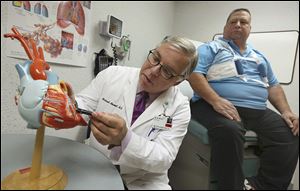
Toledoan gets 1st cow tissue heart valve in U.S.
Man, 56, to have better living with technique than with mechanical
11/5/2014
Dr. Michael Moront uses a model of a heart to explain Rick Sobecki's recent valve replacement surgery to Mr. Sobecki, right, at ProMedica Toledo Hospital.
When Rick Sobecki of Toledo decided to see a doctor in August he was short of breath and having trouble keeping up on the golf course.
A few months later he became the first person in the United States to receive an experimental heart valve made of cow tissue.
Two weeks after open heart surgery at ProMedica Toledo Hospital, Mr. Sobecki, 56, said he is feeling pretty good.
“I’m hoping I get a second chance at life and get to enjoy it,” he said.
ProMedica cardiovascular surgeon Dr. Michael Moront implanted the bovine pericardial tissue heart valve from Medtronic Inc. in Mr. Sobecki in a three-hour procedure Oct. 20. He said Mr. Sobecki was critically ill with significant blockage in his aortic valve.
Dr. Moront asked him to be Toledo Hospital’s first participant in a clinical trial being conducted in 40 hospitals in the United States and Europe. Dr. Moront said he was honored to be the first surgeon in the United States to perform the surgery with the artificial bovine valve. In all he has implanted the new device in three Toledo patients and said they are all doing well.
The aortic valve “is the most commonly replaced heart valve in the U.S. and in the world,” he said. Until now there were two options for replacement valves, those made from pig tissue, which work well but do not have a long life-span or mechanical devices that can last forever. The mechanical valves, though, have major drawbacks. Patients with them must take blood-thinning drugs the rest of their lives and there is increased risk of stroke, he said.
“This valve allows people to live their lives carefree,” Dr. Moront said. The hope is that it will last at minimum 15 years. He said the technology in this field is advancing so rapidly that by the time Mr. Sobecki will need a follow-up surgery to replace this valve, less-invasive alternatives to open-heart surgery likely will be available.
“Only time will truly tell how well it does for the patients in the test trial,” Dr. Moront said.
“Because of the trial they will keep a closer eye on me, which in the long run will be good for me and hopefully give them information to help future patients,” Mr. Sobecki said.
The clinical trial is to outfit 600 patients with cow-tissue heart valves, Dr. Moront said.
Contact Marlene Harris-Taylor at mtaylor@theblade.com or 419-724-6091.